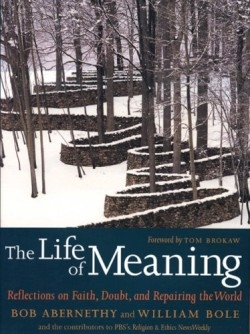
The Life of Meaning
Reflections on Faith, Doubt, and Repairing the World
“The fundamental obligation of a funeral is to provide an opportunity for the living to confront their dead and to dispose of them in a way that’s other than the way we dispose of a rock or a rhododendron,” writes Thomas Lynch, a poet and second-generation undertaker in a discussion about the importance of funerals. Funerals are not for the dead, he says, but they are an important rite for the living. This is one of the many reflections in The Life of Meaning about faith, spirituality, and making a difference.
During Abernethy’s time as executive editor and host of the PBS program Religion & Ethics NewsWeekly, he and his staff have spoken to hundreds of people with a variety of viewpoints. These people have included spiritual leaders and scholars such as South African Archbishop Desmond Tutu, as well as undertakers, poets, doctors, and war veterans. He and William Bole, a religion writer whose work has appeared in the Washington Post, have compiled sixty-six interview excerpts into a thoughtful collection that reveals meaning in such complex subjects as death, war, religion, and a field in rural Shanksville, Pennsylvania.
A chapter called “The Meaning Makers” begins the book. “We manufacture meaning out of the rawest materials—out of sickness, war, death, as well as routine events. These days, we even look to extract meaning from molecules,” the authors write.
Dr. Francis Collins, a medical doctor, chemist, director of the Human Genome Project, and “serious Christian,” explains how his faith can coexist with his knowledge of science. “I believe that God is the greatest scientist. I believe that God gave us the abilities to explore the natural world and to appreciate the grandeur of his creation,” he says. The Human Genome Project, nearly completed in 2006, is a complete record of all the genes contained in human DNA. Collins calls this “the language of God.”
Assigning meaning to significant events sets the stage for the chapters to follow. In “Evil and Suffering,” interviewees explore their faith, which has been challenged—but not destroyed—by experiences including the Holocaust, 9/11, cancer, and the death of loved ones. Historian Edward Linenthal discusses his thoughts on visiting the Pennsylvania field where United Airlines Flight 93 crashed on 9/11: “The natural beauty of the site was such a contrast with the horror that had happened there.”
In the chapter, “Prayer and Meditation,” people explain how, through praying, they are comforted and given greater understanding; and finally, “Lives Well Lived” features conversations with people who have made a difference around the world by establishing health centers, homes for the mentally disabled, and schools:
“There’s a certain amazement on my part as to how easy it was help change a child’s life completely. It wasn’t thousands of dollars, it was a hundred dollars,” says Scott Neeson, a former Hollywood executive who gave up his mansion, yacht, and sports car to set up a school for homeless children in Cambodia, where he now lives.
Studies and recent polls have shown that, despite a purported secular revolution, the majority of Americans are still religious. “[B]etween 1984 and 1998, the percentage of Americans who said they felt the need for greater spiritual growth leaped from 56 percent to 82 percent,” the authors write. Here, people from all points on the spiritual spectrum weigh in on the things that give their lives meaning.
Catholicism, Evangelicalism, the African-American Church, Judaism, Mainline Protestantism, Islam, Buddhism, and Hinduism are all discussed by practitioners of each religion. They discuss their own faith’s history, traditions, fundamental beliefs, and what it is like to be religious in today’s society. Seyyed Hossein Nasr, a professor of Islamic studies at George Washington University, explains how the 9/11 hijackers were “blinded by their own narrow, exclusivist interpretation of Islam,” and how his religion is as capable as any of embracing a democratic form of government.
This absorbing book demonstrates the many paths available to those who choose to make a positive impact on the world. The men and women interviewed here speak with conviction and passion, enabling readers to begin to understand and respect the distinct cultures, even if their beliefs are contradictory.
In a time when political correctness and “diversity” often come at the price of disparaging Christianity and traditional Western religions, this refreshing collection gives weight to all faiths.
Disclosure: This article is not an endorsement, but a review. The publisher of this book provided free copies of the book to have their book reviewed by a professional reviewer. No fee was paid by the publisher for this review. Foreword Reviews only recommends books that we love. Foreword Magazine, Inc. is disclosing this in accordance with the Federal Trade Commission’s 16 CFR, Part 255.
